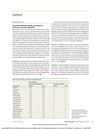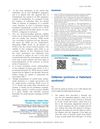 7 citations,
September 2013 in “Current Dermatology Reports”
7 citations,
September 2013 in “Current Dermatology Reports” Some skin medications are safe for pregnant women, but others pose risks or should not be used.
 7 citations,
April 2012 in “Clinical investigation”
7 citations,
April 2012 in “Clinical investigation” Transdermal testosterone can improve sexual desire in postmenopausal women but lacks long-term safety data and is not FDA-approved for this use.
2 citations,
February 2005 in “Postgraduate obstetrics & gynecology” Certain medications can help treat PCOS symptoms, but they aren't FDA-approved for this use.
 April 2024 in “Expert opinion on emerging drugs”
April 2024 in “Expert opinion on emerging drugs” New treatments for male hair loss are being explored to improve effectiveness and reduce side effects.
 46 citations,
January 2008 in “Climacteric”
46 citations,
January 2008 in “Climacteric” Testosterone therapy can help improve sexual desire and function in postmenopausal women but may cause side effects and is not FDA-approved for this use.
 April 2024 in “Journal of cosmetic dermatology”
April 2024 in “Journal of cosmetic dermatology” Minoxidil is less effective on eyebrows and eyelashes than scalp hair because these areas have lower enzyme activity needed to activate the drug.
 15 citations,
October 2017 in “Dermatologic Clinics”
15 citations,
October 2017 in “Dermatologic Clinics” New treatments for male hair loss show promise but need more research for safety and effectiveness.
 8 citations,
June 2017 in “JAMA Dermatology”
8 citations,
June 2017 in “JAMA Dermatology” Women pay more for the same 5% minoxidil foam than men, but prices for liquid solutions are similar.
 September 2015 in “한국임상약학회지”
September 2015 in “한국임상약학회지” The document's conclusion cannot be determined without content.
 1 citations,
December 2017 in “The journal of investigative dermatology. Symposium proceedings/The Journal of investigative dermatology symposium proceedings”
1 citations,
December 2017 in “The journal of investigative dermatology. Symposium proceedings/The Journal of investigative dermatology symposium proceedings” Treating alopecia areata is difficult due to limited approved treatments, but new therapies like JAK inhibitors show promise.
 42 citations,
March 2006 in “Drug Discovery Today: Therapeutic Strategies”
42 citations,
March 2006 in “Drug Discovery Today: Therapeutic Strategies” The conclusion is that we need more effective hair loss treatments than the current ones, and these could include new drugs, gene and stem cell therapy, hormones, and scalp cooling, but they all need thorough safety testing.
 1 citations,
February 2022 in “Lasers in Medical Science”
1 citations,
February 2022 in “Lasers in Medical Science” Low-level laser therapy is about 80% effective in treating hair loss, with best results in males, those who use it for over a year, and those with scalp conditions like dandruff and rash.
4 citations,
April 2022 in “Microorganisms” Povidone iodine reduced skin bacteria more than chlorhexidine gluconate, but neither met FDA reduction standards.
 7 citations,
October 2019 in “Annals of palliative medicine”
7 citations,
October 2019 in “Annals of palliative medicine” New targeted cancer drugs can cause skin side effects, and managing them requires patient education and timely care.
1 citations,
August 2021 in “Cosmoderma” Low-dose oral minoxidil is effective and well-tolerated for treating hair loss.
Scalp med(R) effectively and safely improves hair count and thickness in men with androgenetic alopecia.
14 citations,
August 2021 in “Molecular Genetics and Metabolism Reports” Pegvaliase effectively reduces blood phenylalanine levels in most PKU patients, but requires personalized plans and good communication to manage side effects.
November 2007 in “Hospital pharmacy” The conclusion is that healthcare professionals should report adverse drug reactions to improve medication safety and patient care.
February 2012 in “Hospital Pharmacy” 7 citations,
April 2016 in “PubMed” Laser Doppler imaging can predict how well minoxidil will work for female hair loss.

Some plant-based ingredients may help with hair growth and care, but more research is needed to confirm their effectiveness.
30 citations,
March 2007 in “Expert opinion on drug safety” Cetuximab often causes skin rashes, and managing these is important for cancer treatment.

Lavender is widely used for its calming effects and in beauty products, but its medical effectiveness is not fully proven and not FDA-approved.
 July 2023 in “JAAD International”
July 2023 in “JAAD International” Two drugs, finasteride and minoxidil, are approved for hair loss treatment, but new therapies are being developed.
July 2018 in “Investigative Ophthalmology & Visual Science” January 2008 in “Journal of Clinical Dermatology” 34 citations,
April 2001 in “PubMed” Vaniqa cream slows unwanted facial hair growth in women.
 1 citations,
January 2014 in “Indian journal of dermatology, venereology, and leprology”
1 citations,
January 2014 in “Indian journal of dermatology, venereology, and leprology” The symptoms described align more with Haberland syndrome, not Delleman-Oorthuys syndrome.
 25 citations,
June 2020 in “Dermatology practical & conceptual”
25 citations,
June 2020 in “Dermatology practical & conceptual” Scalp cooling can help prevent hair loss from chemotherapy, but treatment should be tailored to the individual and more research is needed.

















